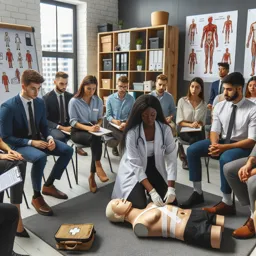Introduction to Wilderness First Aid
Venturing into the great outdoors brings a sense of adventure and excitement, but it also carries certain risks. Being prepared for unexpected injuries or medical emergencies is crucial for any outdoor enthusiast, adventurer, or professional guide. Wilderness First Aid (WFA) equips individuals with practical knowledge and skills to manage medical situations when help is hours—or even days—away.
Why is Wilderness First Aid Important?
Unlike urban environments where medical assistance is readily accessible, remote settings present unique challenges. The absence of immediate emergency services, limited supplies, and harsh environmental conditions can complicate even minor injuries. Wilderness First Aid empowers you to assess, stabilize, and manage medical emergencies until professional assistance is available, turning potential disasters into manageable situations.
Key Components of Wilderness First Aid Training
- Patient Assessment: Learning how to quickly evaluate a victim’s condition and prioritize care according to severity.
- Basic Life Support: Managing airway, breathing, and circulation with limited resources.
- Wound and Injury Management: Addressing bleeding, fractures, sprains, and burns using improvised materials.
- Environmental Emergencies: Preparing for hypothermia, heat-related illnesses, altitude sickness, and animal bites or stings.
- Improvisation: Making effective use of what’s available, from turning backpacks into splints to using clothing as bandages.
Essential Wilderness First Aid Supplies
Carrying a well-stocked first aid kit adapted to your trip and being familiar with its contents is vital. Essential items include:
- Assorted bandages and gauze
- Adhesive tape and moleskin
- Antiseptic wipes
- Blister care products
- Splints and triangular bandages
- Personal medications
- Gloves and a breathing barrier
- Emergency blanket
Building Decision-Making Skills
Wilderness First Aid is not just about techniques—it’s about sound judgment. Developing the ability to decide when to stay put, when to improvise shelter, or when to evacuate someone is just as important as knowing how to dress a wound. Practice scenarios, group decision-making, and learning to stay calm under pressure build the confidence necessary for effective action outdoors.
Encouraging Preparedness and Responsibility
Preparation is the best prevention. Before any trip, research your destination, review your Wilderness First Aid skills, and make sure every member of your group knows the basics. Investing in WFA training can turn a bystander into a lifesaver when it matters most.
Conclusion
Whether you’re planning a backcountry hike, a camping trip, or a remote expedition, Wilderness First Aid is an essential tool for safety and peace of mind. By learning how to respond effectively to emergencies, you make the wilderness a safer place for everyone.



























